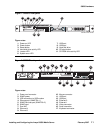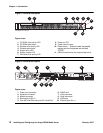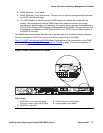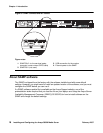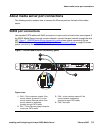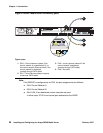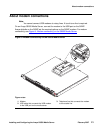
Chapter 1: Introduction
16 Installing and Configuring the Avaya S8500 Media Server February 2007
About the Server Availability Management Processor
The Server Availability Management Processor (SAMP) remote maintenance circuit card is
preinstalled in the S8500 Media Server. The SAMP monitors and reports alerts from the S8500
components to provide remote maintenance and serviceability for the media server. The SAMP
also provides controls to turn on and turn off the power to the media server.
About SAMP functionality
The SAMP circuit card:
● Monitors the fans, the voltages, and the temperature.
● Reports media-server-failure alarms and other alarms to INADS by way of a modem.
Note:
Note: Modem contention is resolved on a first-come first-serve basis. For example,
Services dials into the SAMP, and the media server must send out an alarm
through the modem interface. Although the modem is busy, the media server
continues to try to send the alarm.
● Provides the capability to turn on power and to reset the media server remotely.
● Provides a secure dial-in connection to the SAMP and the host.
● Provides access to the SAMP and subsequently access to the host by way of the Services
laptop.
The SAMP presents a virtual TTY that the media server uses when the media server must send
out alarms through the modem interface (). The system uses the modem that is connected to
the USB port on the SAMP card to report alarms on the:
● Media server by the media server
● Media server by the SAMP, such as server reboots.
● SAMP by the SAMP
About SAMP connections
The SAMP card is installed in PCI-X slot 1 of the Avaya S8500 Media Server. Slot 1 is a
full-height, three-quarters length slot.
The SAMP comes in a half-card PCI form factor and is powered externally. The SAMP supports
one USB interface and two 10/100 Ethernet ports that are located on the rear of the media
server.






